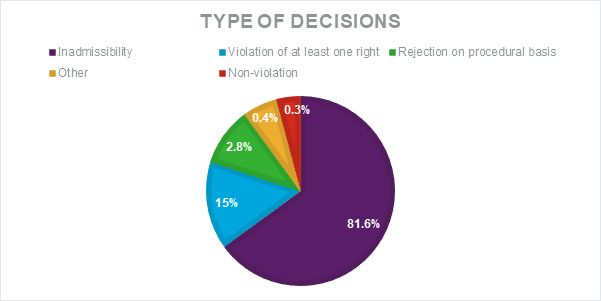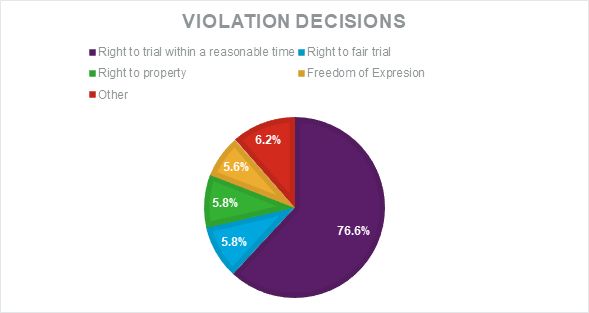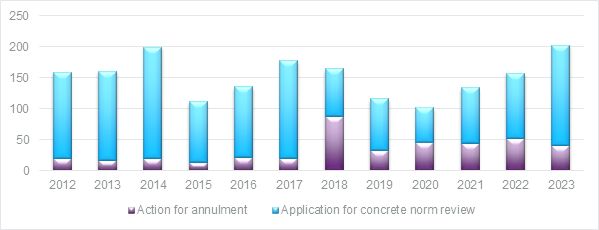- within Tax, Media, Telecoms, IT, Entertainment and International Law topic(s)
- with readers working within the Utilities and Law Firm industries
Turkish Constitutional Court published the statistics on the individual applications made by the persons who claimed that their fundamental rights and freedoms were violated, and the constitutionality review applications made based on action for annulment and concrete norm review, between 23 September 2012 and 31 January 2023, with its reports announced on 18 January 2024.
As these statistics open a window to the perspective of the Turkish Constitutional Court, we would like to share our key takeovers on such statistics. The statistics need to be analysed under two pillars as being the statistics on the individual applications, and on the applications based on the constitutionality review.
Statistics on Individual Applications
Reviewing the key figures presented in the statistics report on the individual application, it is seen that in 2023, 108,816 new individual application was made, whereas the Constitutional Court has finalized 109,694 applications by ruling a verdict on the pending individual applications of 204,737. Considering that a total of 375,017 applications were finalized in the previous years (2012-2022), 2023 proves to be a productive year for the Constitutional Court, which is undoubtedly under a heavy workload. However, the statistics do not provide information on which periods, 109,694 applications finalized in 2023 relates to.
As of the end of 2023, there are 2,709 pending applications from periods between 2013-2020, 4,826 pending applications from 2021, 27,973 pending applications from 2022 and 59,535 pending applications from the applications made in 2023.
On the other hand, approximately 45% of the individual applications made to Constitutional Court in 2023 are based on the violation of right to trial within a reasonable time, whereas 84,557 of the applications finalized in 2023 are also related with such right.
Coming to the overall applications finalized; of the decisions rendered, 81.6% pertained to the inadmissibility decisions, followed by violation decisions covering 15% of the total applications finalized in 2012-2023.

When the applications related to the violation of right to trial within a reasonable time are disregarded, the percentage of the inadmissibility decisions increase up to 92.3%, while the percentage of the violation decisions decreases to 3.8%.
Although the inadmissibility decisions ruled by the Constitutional Court are consist of 81.6% of the whole decisions rendered since 23 September 2012 up until 31 December 2023, the statistics do not show the grounds of such decisions. In other words, it is not possible to understand the statistics on the grounds -whether it is ruled inadmissible because of ill-founded claims, non-compliance to the legal period, the lack of jurisdiction of the court or the legal remedies are not exhausted, etc.- of such inadmissibility decisions, which are final and cannot be appealed.
Coming to the merits of the decisions; of the violation decisions of 73,700 in total, 76.6% pertained to the right to trial within a reasonable time, whereas right to fair trial and right to property follows this with 5.8%, for each.

Considering that lately, the unconstitutionality claims related to the application of tax laws are at the top of the agenda, if the tax disputes initiated with such claims, are finalized against the taxpayers, it might be expected that the individual applications regarding the violation of right to property may increase and this may lead to the increase in the number of violation decisions in this regard, in the upcoming years.
Statistics on Constitutionality Review Applications
When the key figures presented in the statistics report on the constitutionality review applications are reviewed; the first thing to think more of is that, compared to 2022, the applications for constitutionality review have increased at almost 28.6% and have arisen to 202 in 2023.

This leaves us with a total of 411 action for annulment and 1,404 applications for concrete norm review, filed between 23 September 2012 and 31 December 2023.
1,811 of the total applications of 1,815 are resolved; and the remaining unresolved applications are the ones that were filed before the Constitutional Court with a request of concrete norm review.
In 2023, related with the action for annulment applications, the Constitutional Court has ruled 62 annulment decisions, 24 rejection decisions and 2 decisions on unification of the application files. The decisions ruled for the concrete norm review applications are 141 in total, whereas 42 of the files has resulted in annulment of the relevant provision under the law, 76 of the requests have been rejected and the remaining 23 are unification decisions.
On the one hand, these numbers proves that the Constitutional Court increased its productivity compared to the previous years, on the other, this shows that the relevant stakeholders - the President or two parliamentary groups having the greatest number of members in the Turkish Grand National Assembly ("TGNA") or a minimum of one-fifth of the total number of members of the TGNA for the action for annulment application; and the court examining a pending case where the contested law is applicable to, for the request of concrete norm review-, brings more of the laws enacted before the Constitutional Court with the request of examination of the constitutionality of such law in respect of both form and substance. So, it might be noteworthy to think about the quality of the laws enacted by the TGNA, in respect of the constitutionality.
Also, considering the continuous effort of the government to collect more taxes and the expectations of the tax legislation amendments especially after the first quarter of 2024; if the lawmaker does not prioritize conformity with the Constitution while proposing or enacting new laws, it might be anticipated to see an increased number of the constitutionality review applications, in the upcoming years.
Footnotes
1. https://www.anayasa.gov.tr/media/9152/bb_2023_tr_son.pdf
2. https://www.anayasa.gov.tr/media/9151/norm_tr_2023.pdf
The content of this article is intended to provide a general guide to the subject matter. Specialist advice should be sought about your specific circumstances.

